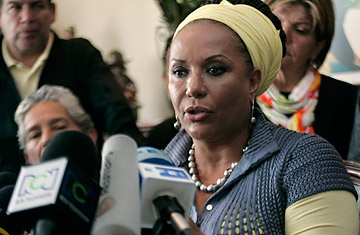
Colombian Senator Piedad Cordoba speaks during a news conference in Bogota in this March 11, 2010 file photo. A statement announced over radio on September 27, 2010 from the Attorney General's Office said Cordoba was removed from office for having collaborated with FARC rebels.
For Colombia's long-suffering hostages, Piedad Córdoba was the great emancipator. Over the past three years, the left-wing senator played a key role in the release of more than a dozen prisoners held by guerrillas of the Revolutionary Armed Forces of Colombia, or FARC. The rebels wanted to trade their captives for jailed guerrillas. But Córdoba — who at times teamed up with Venezuelan President Hugo Chávez — helped convince the FARC to free them unilaterally. Her efforts reportedly put her on the short list for last year's Nobel Peace Prize. Without her intervention, says former hostage Luis Eladio Pérez, who was released in 2008, "we might have died in captivity."
Rather than prizes, however, Córdoba has reaped public scorn, legal battles and unemployment. On Sept. 27, she was stripped of her seat in the senate and banned from holding public office for 18 years. Alejandro Ordoñez, the government's inspector general who issued the disciplinary ruling, alleged that Córdoba went far beyond her role as a neutral mediator. Citing intercepted phone calls, e-mail messages, and testimony from a rebel infiltrator, Ordoñez charged that Córdoba had been playing both sides — pushing for the release of hostages one moment, "promoting and collaborating" with the FARC the next.
Many of the e-mails refer to or were written by a "Teodora Bolívar," whom government investigators say is an alias for Córdoba. In them, Bolívar urges the FARC to stiffen its negotiating stance with the Bogotá government and to withhold proof-of-life videos of the hostages. In one e-mail, a guerrilla commander writes that Bolívar suggested delaying the release of former presidential candidate Íngrid Betancourt because without the famous hostage in the rebels grip, the world would ignore the FARC. In another message, Bolívar downplayed Betancourt's failing health after shocking photos of the emaciated prisoner were released in 2007. "Ingrid is skinny but she's always been skinny," Bolívar wrote. "She won't die from that."
Córdoba, 55, claims she is being singled out for her aggressive brand of opposition politics — she once called on foreign governments to break diplomatic ties with Colombia and suggested young people follow the example of the country's guerrilla leaders. The irony is that many of her jungle meetings with the FARC had Bógota's seal of approval. Frustrated at its own lack of progress on behalf of the hostages, the government recruited Córdoba and Chávez for a brief period in 2007 to serve as go-betweens with the FARC. The ploy worked and Córdoba points to the liberation of kidnapped politicians, police officers and soldiers as proof her work was strictly humanitarian. "I am Piedad Córdoba," she told a crowded Bogotá news conference on Tuesday. "I'm a pacifist and a feminist. I am not Teodora Bolívar."
Either way, Córdoba joins a growing list of leftist politicians, reporters and free-lance negotiators who have come under scrutiny for their contacts with the FARC. Journalist William Parra, who in the 1990s served as spokesman for President Ernesto Samper, was recently accused by the Colombian attorney general's office of financing terrorist activities and sedition. TV host Hollman Morris, who has reported extensively on Colombia's 46-year war, was initially denied a U.S. visa to study at Harvard under the "terrorist activities" provision of the Patriot Act though the decision was reversed last month.
People who have dealt with the FARC say it's no easy task to gain access to and make progress with the group's Marxist ideologues. "They were very arrogant, very close-minded, very hard-to-deal-with individuals," says Daniel García-Peña, the government's peace commissioner in the late 1990s. Yet in the name of freeing hostages, promoting peace, or reporting on the conflict, someone has to go into the shark tank.
James Jones, an American development consultant, got his feet wet in 2007 when he met with FARC leaders in a secret effort to secure the release of three U.S. military contractors. He tried to break the ice by sipping rum and smoking Cuban cigars with the guerrillas while praising their agrarian reform proposals. But such schmoozing can look bad when taken out of context. After word got out about his rebel rendezvous, Jones was questioned by the FBI and immigration officials. "For about a year, I was detained and questioned every time I came back to the United States," he says. "They actually met me at the door of the aircraft."
The fuss over FARC links is the flip side to a much broader scandal — dubbed Para-gate — in which dozens of right-wing lawmakers have been imprisoned for working in cahoots with paramilitary death squads. Córdoba's supporters were shocked when she was unceremoniously kicked out of the senate However, legal experts who have combed through the documents say the evidence is heavily weighted toward Cordoba being Teodora Bolivar and, if so, then her behavior toward the guerrillas constitutes, if not a crime, a serious breach of ethics. Former deputy justice minister Rafael Nieto says: "There is no doubt that if she had acted the same way with the paramilitaries, she would be in jail."
Córdoba's fate also shows how times have changed. During peace negotiations a decade ago, it was fashionable for Bogotá politicians to be photographed grinning and shaking hands with FARC comandantes. But now the Colombian army is winning the war, the FARC is considered a drug-trafficking terrorist organization, and envoys like Córdoba are widely viewed as rebels in disguise. "Piedad may have a certain ideological affinity with the FARC," García-Peña says. "But I'm convinced her dream is to win the Nobel Peace Prize, not to be a guerrilla commander."
